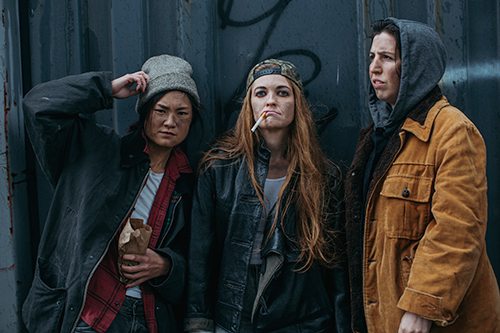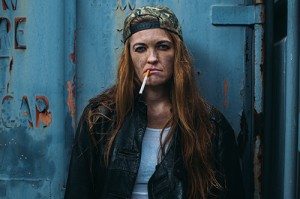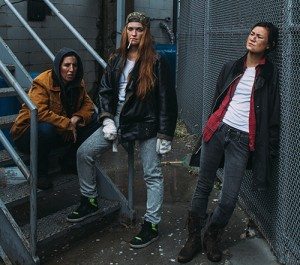

Theater, I like to believe, is in essence an experimental art form. Outside of Hollywood's bounds of studio guidelines and million dollar budgets, it is a completely free space to test boundaries, play with language, and say something that's never been said.
I can think of no better example of this than War Lesbian, the musical currently on stage at Dixon Place. With an Inuit myth as its backbone, it tells an extraordinary yet familiar story of a woman who knows that she is different, and sets out to find her purpose. Futurism, moon gods, and fur coats all play a role.I had the opportunity to chat with playwright Kristine Haruna Lee about all this and more in her incredibly unique piece of theater.
Could you talk a little bit about how you got started writing this piece? I hesitate to say that there's anger, but I certainly feel that there’s almost an urgency to it. Can you talk a little bit about what inspired you and what your writing process was like?
Yeah, it was a pretty long process for me. I, myself, and Kathryn Hathaway [who wrote the music] -- we started on this close to three years ago. She and I -- it’s funny because we actually came up with the title first. Yeah, we were really interested in creating a queer musical together, and we had just been sitting in front of Lincoln Center, and War Horse was up at the time, and we were like, wouldn’t it be great if we created something as epic and large as War Horse but called it War Lesbian?
Then, yeah, we just kept at it. I think it first started with an Inuit myth about Sedna [War Lesbian's protagonist], that’s when we really started reflecting that trajectory of coming out and wanting to become more than what is prescribed, especially for women, the culturally prescribed, socially prescribed. And then the war part came secondly and I think very much informed by the climate right now that we’re living in, just that -- yeah, like you said -- anger, a drive for people, for women especially. There are references to the city in the second half, and the references made to the city, I was really looking at that struggle of surviving or just living as a woman in the city -- a city -- the drive, the anger, the passion, the fire that’s necessary, that’s needed to cut your own space or create your own space. To contend with everything that’s going on in that landscape.

You mentioned your collaborator, Kathryn Hathaway, so I’m assuming this was always intended to be a musical. Did you find that that was a really natural process fitting music into it? You sung a little bit, do you have a musical background?
(Laughs) I wouldn’t say I have a musical background. A lot of like show choir growing up. Katie is super talented. She’s a playwright as well, and we met at New Dramatists in a composer librettist studio, a residency they do for playwrights and for musical composers, so we got teamed up there and just fell in love with each other’s work and energy. Then, we actually ended up going to a Brooklyn College program together as well, so we have a big, long relationship.
You talk about your collaboration with Kathryn, but I also think overall you have a remarkably strong and committed cast. Not being the director, do you play a role in selecting the cast? In such a sort of 'out there' play, what’s your litmus test for knowing that people are really gonna commit and go all the way with you?
I think with casting I got so lucky to find Jordan Fein, the director. We really saw eye to eye on a lot of things. So when we sat down to cast the show and look for people, I pulled a lot from people I’ve worked with because I knew that they would get the vocabulary, because even though this feels like a different strain of my work, it was great to get people who had worked with my text before. And then Jordan brought in these people who were just fantastic, and they totally went for the ride, and you know, we were looking for more, people who were… if it came down to someone who was classically trained in musical theater and someone who was more trained in that cabaret world and burlesque world and had all that energy, we definitely were going for the latter.
Again in regards to casting, did you always know you were going to play Ellen [the demonic Ellen DeGeneres is a character in the play -- no, I'm not joking] when you were writing it? And as a follow up, what is it like to act in a play you’ve written, and how easy is it to give up control to the director?
Yeah, um, I was not gonna play Ellen when we first started this process, looking for people. And then, uh, I think Jordan mentioned it, and then we started to go towards that direction. Oh, there are a couple of people in the cast who are company members of harunalee…
Which is your theater company?
Yeah, harunalee theater company, which is a company I started with some of the folks who were performing in the cast, um, video production, lighting, yeah. I do think about some people when I’m writing, but definitely with Ellen, I was not thinking of myself for it. I think I actually have directed my own work in the past, and [this is] one of the first times I‘ve really given a piece over to a director. I’ve learned so much, and it was difficult, it was such a great challenge, 'cause the actor brain wants to take over, but then my playwright, creative brain wants to have a hand in it, and I remember once Jordan just sitting me down and saying “you have to be an actor!” So yeah, it’s definitely presented its own challenges.

Something that I was really struck by and that I mentioned in my review - whether you intended it or not, it came off as such a distinctly feminine text, and I think some of that is tied into the fact that it was based on myth, but then there are totally everyday or mundane aspects, like when the women are just casually eating popcorn together. Since you started from a myth, how did you find your balance and achieve a blend between those elements that worked?
I think for me what it was a reflection of reality, because we have these insanely, indescribably epic moments in our lives that just jut in nonsensically into this, like, rigorously structured life that we create. And we call these moments plain or mundane and we hold on so tightly to that amidst like craziness that can be going on in our lives. So I think my plays often do reflect that, or the text might seem like those elements are juxtaposing each other in that way.
You also play with words a lot, and I mentioned that I was reminded of Gertrude Stein a little bit -- because there’s so much word play, and it turned almost into poetry at times. Is that your writing or is this something totally new you wanted to create for the play?
I think a lot of that -- the wordplay -- does echo a lot of my previous works, but there was… I love that you mention Gertrude Stein, that’s such an honor, she was definitely a forefront modernist of her time, and the play is playing on futurism as well, and futurism being another kind of subset of modernism. And they really messed around with text a lot, they created their own language. They're finding a way to express their kind of fast and furious vision through text, through words, but sometimes it just... Words themselves couldn't describe what they wanted to express, so they created their own language, they deconstructed a lot of structure, so I think I was pulling from that for inspiration, especially the radio speech.
Okay, so there are poop jokes, there's violence, even the title, which you say came first -- I think there are definitely a lot of elements in the play that are really out there. You must receive a range of responses from your audience -- are you trying to shock people with this play?
You know, all of that -- the extreme to me is all part of the process of laughing, and I think laughing is so important. It activates it to someone watching the performance. And I think a lot of my instincts as a writer is like where is that collision of ideas and that laughter? And how can I, rather than shock, maybe it's some impulse of wanting people to open their mouth and laugh out loud. I love doing that in the theater. I think there's something to comedy, and also really like comedy that comes from a really deep place that does talk about vaginas, that does talk about poop and things that are so much part of our daily lives and we kind of brush off.
And we hear plenty of dick jokes, right? So why should this be so shocking?
(Laughter)
So you had a Kickstarter to pull this whole thing off, and now this is your final weekend. What do you see for the future of this play?
It would be so amazing to do it again, to keep working on it.
Do you see it as a work in progress, or do say, "okay, this is it, it's finished."
I think everything is a work in progress. There's actually a lot of the text that we had to cut -- there's a whole scene about mink fur, and you know just a lot of little things that got cut here and there. It would be amazing to keep working on it and keep finding even new landscapes and setting it in a new space. That would be a whole new challenge.
Anything final thoughts you'd like to share?
I mean, I'm just so grateful -- it took a lot of brains and a lot of great souls coming together, so I'm just so grateful it came out the way it did.
War Lesbian is on stage at Dixon Place until December 20.